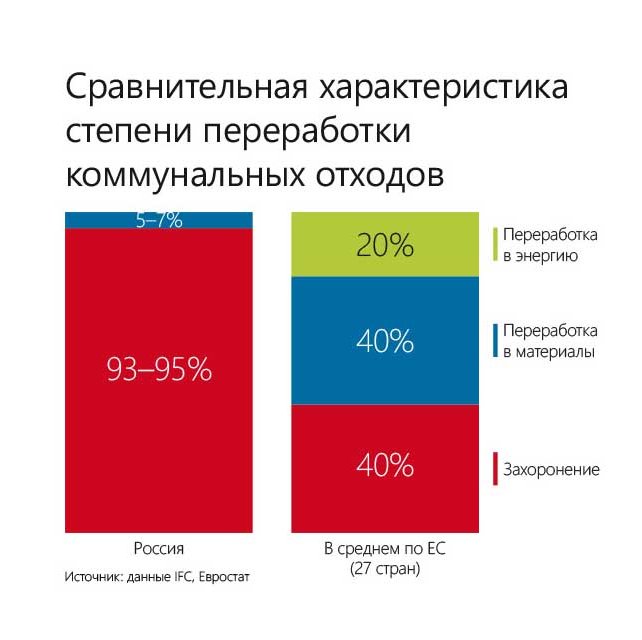Technology Design Standards For Recycling Construction Debris

Human life is associated with a large number of waste generation. The dramatic increase in consumption in recent decades around the world has led to a significant increase in the production of solid domestic waste (CBD). Currently, the mass flow of TBTs entering the biosphere annually has reached almost a geological scale of about 400 million tons per year. In Moscow, it is estimated that between 2 and 3, 5 million tons of solid domestic waste (BW) are produced annually. While only 10 per cent of waste is processed.
The experience of EU countries in monitoring consumption waste generation shows that there is a direct relationship between gross domestic product (GDP) growth and waste growth. Therefore, with continued economic growth, the annual formation of TBTs in Moscow is steadily increasing. There are now 167 TBO sites around Moscow. Of these, only 58 authorized polygones and 109 are natural landfills. 27 polygons have exhausted their capacity and 19 are filled by 90 per cent. Further possibilities for expanding polygones are close to being exhausted.
For example, according to the Ministry of Natural Resources, all domestic waste dumping sites serving the southern part of the capital have exhausted their resources in 2-3 years. At the same time, the opening of new debris cemeteries will be possible only outside the 100-kilometre zone from Moscow. With the ever-increasing flow of waste, the main challenge in the management of TBTs in Moscow is to reduce the amount of waste destined for polygonization through recycling. In a number of industrialized countries in Europe, faced with the increasing problem of the shortage of municipal waste sites in major cities much earlier than Russia, the practical only way to address it radically now is the thermal disposal of solid domestic waste with thermal and/or electrical energy.
The so-called recycling (recycling) of waste by selective collection or disposal of waste in special garbage disposal plants (IDPs) reduces the volume of stored waste. ♪ ♪
The values are given for dry gases given to standard conditions (temperature 273K, pressure 101, 3 kPa, concentration O2-11%).
Related posts:
 In the Volgograd Region Administration, a concession agreement was signed on public utilities, recycling, disposal (storage) of solid household waste. According…
In the Volgograd Region Administration, a concession agreement was signed on public utilities, recycling, disposal (storage) of solid household waste. According… The building is already over, and a bunch of building debris and waste remains lying, rather than seriously ruining the type of capital. As a result, today the required…
The building is already over, and a bunch of building debris and waste remains lying, rather than seriously ruining the type of capital. As a result, today the required… I ve done a lot of franchise monitors, but I ve got the usual bids, a cafe or a store that s already starting to compete with me, I thought I was bored, telling…
I ve done a lot of franchise monitors, but I ve got the usual bids, a cafe or a store that s already starting to compete with me, I thought I was bored, telling… What are the rules for sorting debris on French Riviera? When we rented an apartment in Paris, there were a few large tanks in the interior courtyard where classic…
What are the rules for sorting debris on French Riviera? When we rented an apartment in Paris, there were a few large tanks in the interior courtyard where classic… Is discipline important in investing? Without any doubt it is true! A disciplined investor will never buy securities without serious analysis or pay attention to…
Is discipline important in investing? Without any doubt it is true! A disciplined investor will never buy securities without serious analysis or pay attention to… Structural debris: brick, brisket, concrete, stoves obtained during the dismantling of construction sites are transformed into a secondary building block on GOST…
Structural debris: brick, brisket, concrete, stoves obtained during the dismantling of construction sites are transformed into a secondary building block on GOST… Professional presentation demands more than just content - it requires the right display platform. The Black Easel stands out as a sophisticated solution for artists…
Professional presentation demands more than just content - it requires the right display platform. The Black Easel stands out as a sophisticated solution for artists… An incineration factory in the heart of Vienna is unique not only because it does not completely damage the environment, but it also, unlike its collars, decorates…
An incineration factory in the heart of Vienna is unique not only because it does not completely damage the environment, but it also, unlike its collars, decorates… The Territorial Waste Management Scheme was held by the Parliamentary Hearings at Medoldum Parliamentary hearings of the Regional Waste Management Scheme were held…
The Territorial Waste Management Scheme was held by the Parliamentary Hearings at Medoldum Parliamentary hearings of the Regional Waste Management Scheme were held… Environmentally sound behaviour is very often consistent with the principles of rationality, servitude, prudential treatment of purchases, by their time, to environmental…
Environmentally sound behaviour is very often consistent with the principles of rationality, servitude, prudential treatment of purchases, by their time, to environmental…